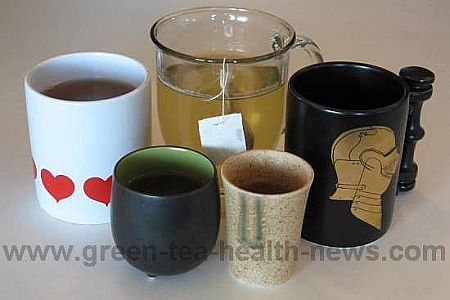Prostate Cancer Prevention: Daily Green Tea Reduces Risk Of Tumors By 90%*

Prostate cancer prevention strategies
Choosing lifestyle strategies to reduce their risk may be the best hope for most men.
Prostate cancer currently claims 80% of men by the time they are 80 years old.
But because it can take decades to develop, men have the opportunity to choose prostate cancer prevention lifestyle strategies.
*Green tea shows 90% less prostate cancer
Researchers in Italy studied 60 volunteers with high cancer risk who had tested positive on biopsy for high-grade prostate intraepithelial neoplasia (HG-PIN).
PIN is a prostate cancer test that has become an accepted sign of premalignancy.
Men who have a positive biopsy for PIN are considered at high risk for prostate cancer.
The volunteers were divided into two matched groups and took either 3 capsules (200 mg. each for 600 mg. daily) of green tea daily for one year or a placebo daily for one year (Bettuzzi S et al, Chemoprevention of Human Prostate Cancer by Oral Administration of Green Tea Catechins in Volunteers with High-Grade Prostate Intraepithelial Neoplasia: A Preliminary Report from a One-Year Proof-of-Principle Study, Cancer Research, January 2006).
The research results showed:
- 90% of the men had no prostate cancer with green tea
- No side effects
At the end of the year, only one man in the green tea group had developed a tumor while nine men in the placebo group developed tumors.
These results of reducing the risk of 90% of prostate cancers were statistically significant, although conclusions are considered preliminary.
No side effects with daily green tea
In the green tea group, International Prostate Symptom Scores improved significantly, urinary tract symptoms improved, and there were no side effects.
The annual cost of daily green tea is estimated at $120.
Drugs that only stopped up to 25% of prostate cancer
The recent Prostate Cancer Prevention Trial (NCI, 2003), studied finasteride, a drug currently approved for benign prostatic hyperplasia.
Researchers tested finasteride for prostate cancer prevention with 18,882 men for approximately 7 years.
They studied only men who were low risk by testing negative for prostate cancer.
The results showed that finasteride stopped 25% of prostate cancer with side effects including impotence, loss of libido, as well as an increase in aggressive high grade prostate cancer.
The annual cost of daily finasteride is estimated at $800-$1200.
In a different study, a 12 year follow-up found that daily aspirin for more than five years was associated with a 20% reduction of prostate cancer. (Jacobs E et al, A Large Cohort Study of Long-Term Daily Use of Adult-Strength Aspirin and Cancer Incidence, Journal National Cancer Inst, February 2007)
Side effects from daily aspirin can include gastrointestinal bleeding.
Green tea works in many ways
While these results are considered preliminary, other studies show similar results.
Almost 200 studies on green tea (Camellia sinensis) and prostate cancer have shown that green tea
- kills cancer cells through apoptosis,
- reduces cancer cell adhesion to normal cells,
- reduces cancer initiation,
- reduces cancer progression,
- reduces cancer metastasis,
- prevents DNA damage from free radicals, and
- protects normal cells.
Many positive results have been attributed to EGCG, epi-gallocatechin gallate, the primary polyphenol catechin antioxidant in green tea.
Choosing lifestyle strategies now
Take advantage of regular early testing , especially if you are in a high risk group (African-American, over age 55, family history of prostate cancer).
Discussions with your health care provider should include safe and inexpensive lifestyle changes such as daily green tea and low fat diets (check this list of high saturated fat food).
More prostate cancer prevention studies
Continue to Part 2--Prostate cancer prevention research summaries
Continue to Part 3--Prostate cancer research on green tea and soybean in the diet

Normal Prostate Gland X12 Photographic Print
Buy at AllPosters.com
More health info with free subscription to the Green Tea Health Newsletter here:
Tell A Friend
Are you a member of a social networking site like Facebook, Google +, or the popular Twitter? If you like my website, share it with your friends and family! I appreciate it also, and thank you in advance.
http://www.green-tea-health-news.com/prostate-cancer-prevention.html
Was this page on prostate cancer prevention helpful? Here's more health info
More Tea And Goodies
Subscribe to the free e-zine, Green Tea Health News for free ebook offers, link archives, helpful products, hot deals, and more.Subscribe now and don't miss a single issue.
This website supports
planting Giant Sequoia trees.Find out more!

